Occupy London - Finsbury Square
OccPix | 16.05.2012 09:23 | Occupy Everywhere | Free Spaces | Social Struggles | London

Catch some rays

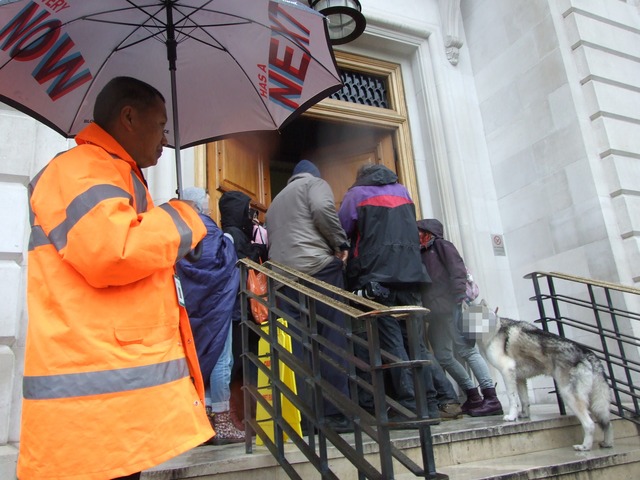
Bloomberg
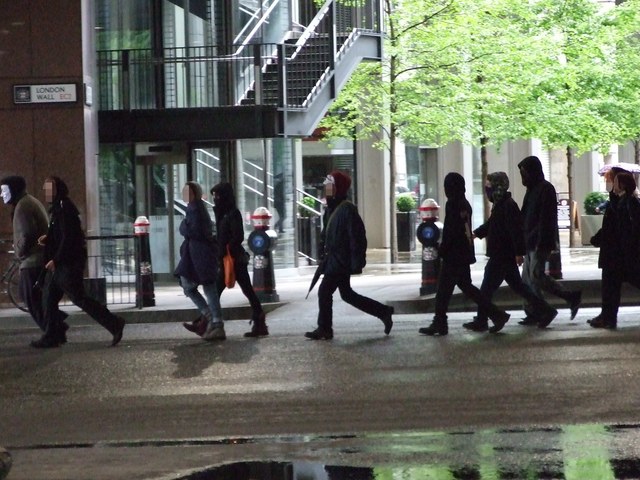
Chase is on
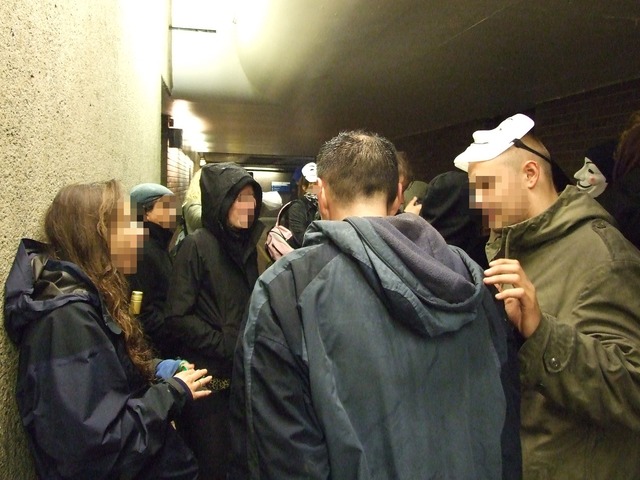
Regroup & plan
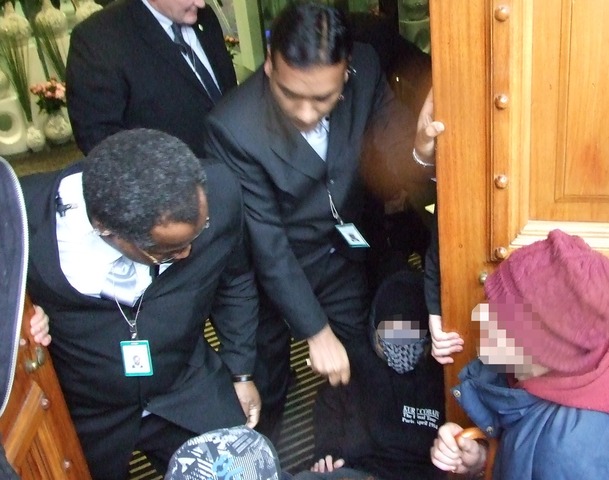
Oops. The door wont close
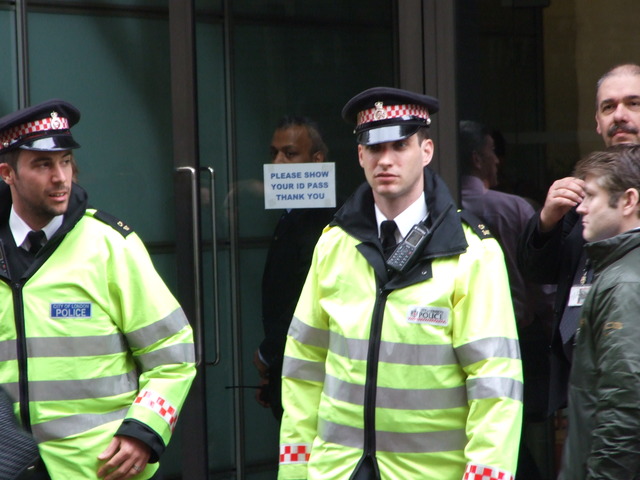
You won't get in

But We'll get back out ...
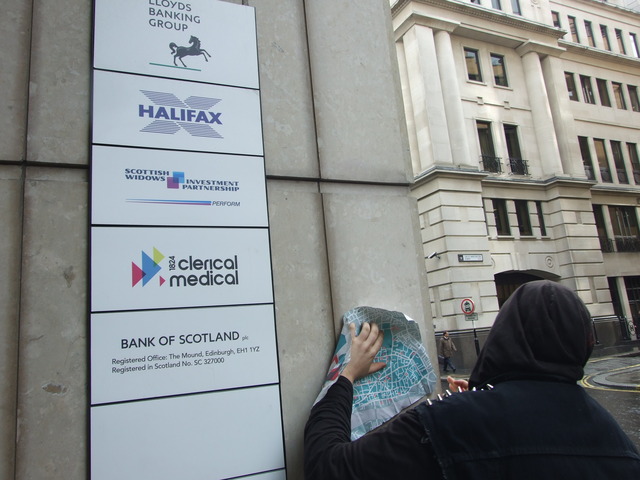
Plan

Chill

Who's next?
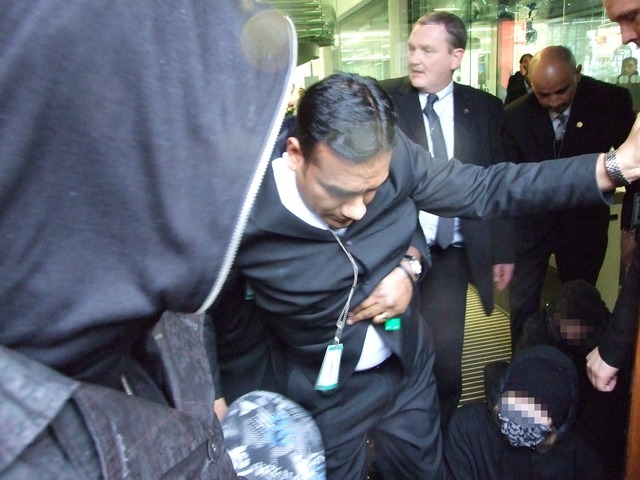
Damned door's stuck again

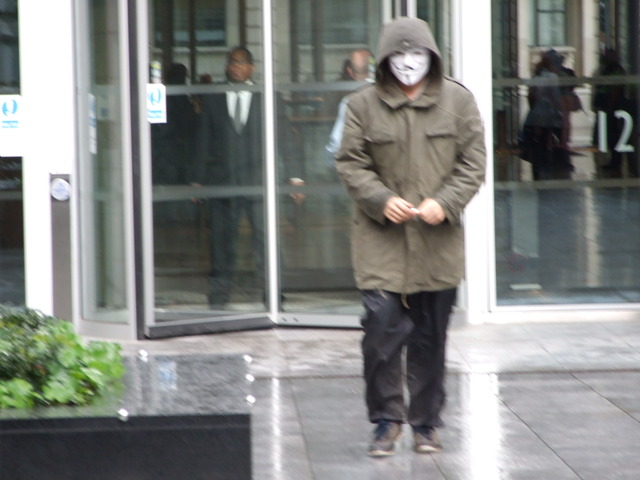

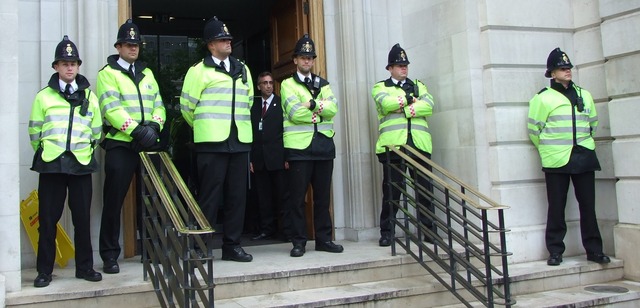


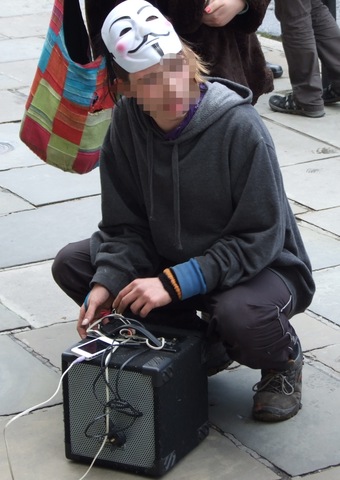
Party Time

The Occupation is now Occupied
OccPix
Comments
Hide 2 hidden comments or hide all comments
Revolutionary Anarchism, Occupy & the Anti-Globalization Movement
16.05.2012 11:45
"The Idea That Refuses To Die"
And anarchists were in the thick of these protests and solidarity actions, whether in Rio, Johannesburg, Prague, Istanbul, New York or Dublin, demonstrating an impressive organizational ability, growing credibility, and rising popular appeal.
In the bourgeois media, anarchists have assumed a prominence unknown since the 1960s, amazingly receiving even more credit than was our due for our role in the new 'anti-globalization' movement. Anarchism was, the New York Times exclaimed, "the idea that refuses to die." The authoritarian left, shocked at being so outflanked and outmaneuvred by the anarchists, suddenly found it necessary to write vicious, and often grossly dishonest, polemics against anarchism.
It is ironic, then, that the anarchist movement remains wracked with disagreement about how it should orientate itself towards the Occupy and 'anti-globalization' movement.
While the Platformist tradition of anarchism, and many anarcho-syndicalists have strongly identified with the new movement, many other comrades seem reluctant to become more involved in the new movement. Some are rightly concerned about the presence of reformist and middle-class elements such as NGOs in the movement; others point to the unexpected support of far right groups such as fascists and Islamic fundamentalists for 'anti-globalization'; for others, there are suspicions about the role of right-wing trade union leaders in the movement.
These concerns are valid. But they should not be used as reasons not to be involved in the 'anti-globalization' movement. The new movement represents an important development for the international working class and a massive opportunity for the anarchist movement at the dawn of the twenty-first century. Seizing the moment, being involved, shaping the movement - this is the best opportunity available today to implanting anarchism within the working class and clawing our way back to our rightful place as a movement of millions, a movement that can help dig capitalism's grave.
Anti-Capitalist, Not Just 'Anti-Globalization'
When we enter the 'anti-globalization' movement, though, we must enter as conscious anti-capitalists. 'Anti-globalization' is a vague term that opens the resistance to capitalism to all sorts of pitfalls.
Many aspects of globalization - if by this we mean the creation of an increasingly integrated world economic, political and social system- should be welcomed by anarchists. The breaking down of closed national cultures, greater international contact, a consciousness of being "citizens of the world", concern for developments halfway around the world - all are positive developments.
We should not line up with those who, under the banner of 'sovereignty' and 'nationality' call for the enforcement of national culture, national foods, closing of the borders to 'foreign' influences and so forth. This outlook - even if dressed up in 'anti-imperialist' clothing - is xenophobic and directly implies support for local nation-states.
We must support the possibilities for the development of a cosmopolitan international culture, the globalization of labour and the labour movement that are emerging with globalization. We must totally oppose the religious fundamentalists, nationalists and fascists whose problem with globalization is that it opens people to new ideas that challenge backward prejudices and cultural practices. Culture is not static. It is changed and reshaped through struggle, and we anarchists should only defend those elements of national cultures that are progressive and pro-working class.
What anarchists oppose are the neo-liberal, capitalist, aspects of globalization. We oppose attacks on wages, working conditions and welfare, because these hurt the working class and because they are in the interests of capitalists.
These capitalist aspects of globalization are an international class war rooted in capitalism, and its current crisis of profitability. Notwithstanding the hype about the "new economy" and the "new prosperity", capitalism has been in crisis since around 1973. Average growth rates in the West in the 1950s were around 5% per year; by the 1970s, they fell to 2%; by the 1980s, the figure was closer to 1%. And so, big business has been trying to restructure itself for survival and renewed profit through the implementation of neo-liberalism: casualization, privatization, subcontracting, welfare cutbacks, regressive tax reform, and the deregulation of trade and money movements. All of these policies are in the interest of the dominant sections of the capitalist class - the giant transnational corporations.
Outside And Against The State
The capitalist nation state is not the victim of capitalist globalization, as some suggest - usually from a nationalist, state-capitalist, or reformist perspective - when they argue that the development of large companies and large multi-lateral institutions like the IMF and WTO leads to a loss of 'sovereignty' by a supposedly innocent nation state, which is then 'forced' to adapt to the 'new reality' of 'globalization'.
These sorts of argument have some serious political implications. They divert attention away from the role of the nation state in driving neo-liberal restructuring. They also tend to suggest that the nation state - 'our' nation state - is an innocent victim that 'we' must ally with and defend against a 'foreign' globalization. On the contrary, anarchists recognise that the nation state is one of the main authors of globalization, and, in particular, the capitalist aspects of globalization.
The IMF, World Bank, and WTO are organizations made up of member nation states, as is the United Nations. It is the nation state that has implemented neo-liberal attacks on the working class the world over. It is the nation state that has allowed giant corporations to operate globally, by dismantling the closed national economies of the 1945-1973 period, which were characterised by the thinking that "what's good for Ford is good for America."
It is neo-liberal restructuring, implemented and enforced by the nation state, which has made it possible for international labor markets, international capital movements, and international production chains to emerge on the scale that has taken place (I include many Third World nation states here, including 'my' own, South Africa: witness the fact that the South African capitalist class government is reducing tariffs faster than the WTO requires. When the WTO asked South Africa to open up its textile industry over 12 years, our rulers volunteered to do the job in just eight! So capitalist globalization is not something simply imposed on 'us' by the global system, imperialism, etc., although these play a role).
The nation state is part of the problem. One is as bad as another in this respect. Therefore anarchists do not agree with people like Ralph Nader who argued, roughly, 'Vote me, so I can save our democracy from the big companies', because anarchists know that the role of the State is to serve those companies: this is what the State does! This is where we part ways with those who think the state is an ally of labuor and the poor in the fight against capitalist globalization.
As such, anarchists cannot agree with idea of a right/left anti-globalization coalition, or the liberal myth that we have now moved 'beyond left and right.' (Witness the Seattle protests: the liberals gave semi-fascist Pat Buchanan a platform, but whined when the anarchists attacked Niketown).
Against National Protectionism
We fight outside and against the State, trying to organize internationally. True, cheap imported goods do threaten jobs 'at home'. But the solution is not to call on the state to ban these goods: it is to organize workers in all the sweatshops around the world. We fight for international labour unity, an international minimum wage, international labor standards, and never national protectionism and trade bans.
Anarchists want self-managed, class-confrontational struggle, rather than 'engaging' the system. Anarchists want to build self-managed forms of struggle and action, rather than placing our faith in technocracy, elections, or 'our' governments. In this picture, the use of violence is a tactical question, not a principle: lock down or burn down are choices to be made according to the situation. This is precisely what the liberals and pacifists refuse to see.
Into The Anti-Globalization Movement
We must enter the new anti-globalization movement. True, it is full of reformists and middle class elements. But this is precisely why we must be involved! To stand back is to surrender the new movement, with its immense revolutionary potential, to the reformists and middle class. It is to abdicate our revolutionary duty to merge revolutionary anarchism with the struggles of the working class, to prevent the revolt of the slaves being used to hoist another elite into power.
It is not a question of whether we should be involved. It is an issue of how.
The aims of anarchist involvement are surely:
1) To promote the self-management of struggle: at every point, anarchists must fight for organisational forms, protest forms, and decision-making forms that rest upon the active involvement of the working class and provide an opportunity for the class to self-manage the struggle, win confidence, and fight from below.
This means:
- Occupations, rather than elite sabotage.
- Marches and protests and riots, rather than policy advocacy.
- Action committees operating through mandates and accountability through assemblies and summits, rather than the delegation of all responsibility to a small coterie of leaders.
- Decentralised coalitions which allow the maximum initiative from below.
- Building the capacity of organisations through promoting horizontal linkages between groups, and by ensuring the widest dissemination of information to the 'base' members of the structures
- Fights and demands that promote class polarization and expose the class basis of neo-liberalism.
We can raise 'reformist' demands with a class war bite. (For example, take a company in a financial crisis. The bosses will say let's save money by outsourcing workers and slashing jobs. Anarchist militants can instead raise the apparently 'reformist' demand that the company can be saved by slashing management salaries by 80%. This will expose the unfair nature of the system, the class wage gap, and the refusal of bosses to really consider alternatives - because they sure won't consider this one - all of which will deepen class polarisation!)
2) Fighting the government: anarchists must be there arguing against national protectionism, against arguments to 'engage' the local state, against calls for the state to 'stand up' to capital, against multi-class coalitions and calls for nationalisation. Instead, our focus must be on promoting the self-emancipation of the working class through its own struggles, organizations, and efforts, on the need to mobilize outside and against the state, and on class struggle anti-capitalism).
This means:
- Fighting for practical international solidarity with workers in sweatshops and in subcontracting companies through campaigns, actions etc., informed by the overall perspective of winning international labor standards (a global minimum wage, global basic conditions of employment, etc.) and global trade unionism of the base. This is the real working class basis for opposing cheap imports: better wages for all, rather than a race to the bottom where we see who can earn the least, or chauvinist protectionism.
- Labour-based regulation of working conditions, through practical solidarity action, rather than appeals to the WTO, etc. to enforce labour standards through a social clause in free trade agreements etc.
- Exposure of the class basis of neo-liberalism as an attempt to drive down wages and working conditions, and open up the economy for privatisation and speculation, and hence, of the need for a class response that has no illusions in the capitalist state
- Opposing privatisation because it harms the working class through job loss and worsening social services, and not because we think nationalisation is some sort of step towards socialism and workers' control. Instead of calling for more nationalisation as an alternative to privatisation - which won't happen and in any event won't empower the working class - anarchists should raise demands for worker and community self-management of social services and infrastructure, and stress the right of the working class to a decent life.
Aims And Objectives
The aim of these tactics and demands is simple. These points are put forward as means to develop a powerful, democratic, and internationalist working class coalition centred on unions, but also involving communities, tenants, students, etc. Further, these points are also meant to help develop a libertarian and anti-capitalist consciousness of the international nature of the class struggle, the opposition between the working class, on the one hand, and the state and capital on the other, and a generalised confidence and belief in the desirability, necessity and possibility of self-managed stateless socialism (i.e. anarchy).
Many in the 'anti-globalization' movement will not accept these aims. But this is precisely why our intervention in the anti-globalization movement as militants with clear ideas and tactics is so vital.
And this is also why we need anarchist political organizations with theoretical and tactical unity and collective responsibility, groups of the type advocated by Nestor Makhno and Peter Arshinov in the Organizational Platform of the Libertarian Communists in 1926. Unity, clarity, dedication are our indispensable revolutionary weapons against an enormously powerful and confident capitalist enemy.
We can win.
Bikisha Media Collective
 e-mail:
bikisha@mail.com
e-mail:
bikisha@mail.com
Logan's Run
16.05.2012 16:33
Suggest pre-empting this move as you can't be a member of anonymous forever
when daddy stops paying the bills
Hide 2 hidden comments or hide all comments